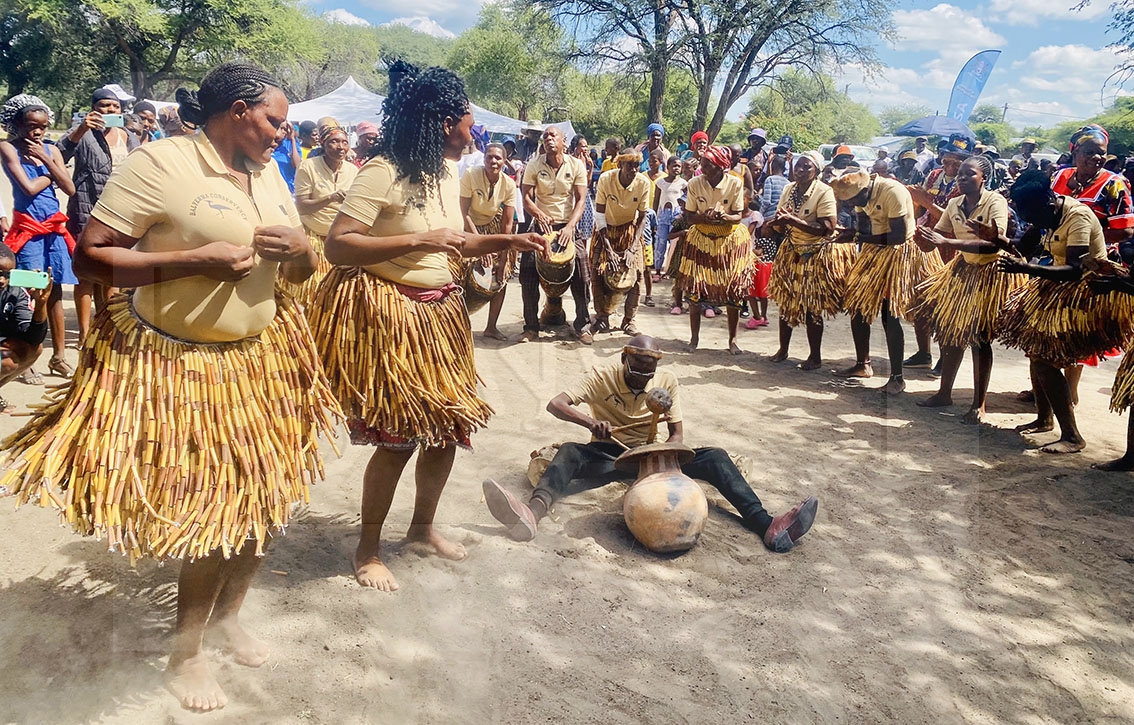utilise artistic gifts'
16 Apr 2024
Some studies have revealed that one of the keys to happiness and satisfaction is right on the dance floor.
The Maun-based youth, Siyana Hetu, is testament that resorting to traditional dance can empower fellow youths to realise and pursue their talents independently.
He is of the view that joining local traditional dance clubs could help to keep young people away from unbecoming behaviour and help them to conquer new horizons.
Hetu said in an interview that young people should embrace change and utilise their artistic talents to earn a living citing traditional dance as one area that they could tap into.
Although, some, he said perceived traditional dances as a hobby, he stated that they could commercialise it in order to make a living.
He said time has come for young people to join the art industry as it creates job opportunities instead of relying on white collar jobs, which are limited.
Hetu said: “Of course music and dance not only serve as a social glue but are also useful for our physical and mental health. I used to be engaged in all forms of bad behavior during my school days as I was bullying, mocking and ragging others. I remember the day when one of my friends invited me to watch one local traditional group during its rehearsal session and I enjoyed it. The most eye-catching part was when performers made sombre humming sounds and thus touched my soul and that is when my passion for traditional dance developed. Since I was not academically gifted, I resorted to join the group after I failed my Form 3.”
Since then, the journey for the 33-year-old Hetu, popularly known as Taucha Taucha in the music circles, started as he had positive thoughts, better concentration and greater sense of peace and tranquility.
He indicated that the dance was not only an excellent therapeutic resource but it also had a positive effect on his daily life.
He said traditional dance transformed his life as he realised his talent and made connections with others, which was vitally important for human health.
He said he refrained from social ills and started focusing on his future.
“Joining the group kept me engaged most of the time and that also helped to combat loneliness and idling mind,” he added. “I also realised that traditional dance is so rewarding and it is a gift and when shared, it is beautiful.”
Hetu appreciated that the group gave a platform to creative youths to express themselves artistically noting that participating in traditional dances also promoted discipline and teamwork while also fostering a sense of community and belonging.
Later, he joined the Kasane based “Tse Tilodi Traditional Troupe, which comprised of multi-talented artists.
He said the group was one of the giants in traditional song and dance.
The group has a huge following and it has made waves nationally and internationally.
He also danced with various groups including Ngwao Thebe based in Letlhakane and clubs some in South Africa in the likes of Di Tswammung and Matlotse Traditional Troupes.
His experience and passion for dancing led him to recruit young dancers to form a dancing group ‘Tsa Goo-Tawana Cultural Group in Maun. Hetu acknowledged that the group was talented and also it helped young people to stay busy and reach their goals through dance. “I am determined to coach the group and take their dance to the rest of the country,” he said. “I want to raise the group profile and ensure it participates and shines in this year’s regional and National Arts Festival.”
He said it was important to introduce traditional dances to younger generation. Learning traditional dances could be fun and an enriching way for young people to explore different cultures and expand their world-view.
Traditional dances, he said, also helped preserve and promote cultural heritage, allowing people to connect with their roots and understand the history and traditions of their communities.
The young and vibrant Hetu also has big plans to open a cultural school through which youngsters could be introduced to traditional dance. Through the academy, he said people would learn more about the Ngamiland diverse culture and relate issues to ensure continuity and preservation of the region’s culture.
He said young people were roaming the streets because of limited employment opportunities and believed that through the academy, they could realise their talents and utilise them for their benefits.
Ngamiland, he said, was a tourism destination and he believed that the academy could also promote cultural tourism as tourists would have an opportunity to visit the facility and appreciate and enjoy creativity, vibrant culture and arts through performances and displays. ENDS
Source : BOPA
Author : Esther Mmolai
Location : MAUN
Event : Interview
Date : 16 Apr 2024







